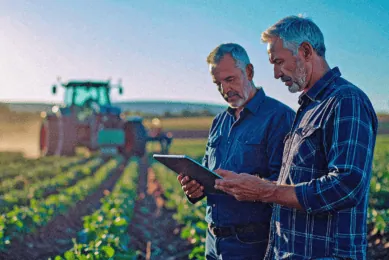More tech-adoption pressure in Canada’s food sector

In many ways Canada is a small global player when it comes to secondary industry – that is, manufacturing and processing as opposed to primary commodity production, and this applies to food as much as it does petroleum. Given the circumstances, many feel tech-adoption is the main way Canadian industry can stay competitive.
But incorporating cutting edge technology is easier said then done, particularly in the food sector. Whether farms or food processors, it can be tough to know what technologies to adopt, and who to work with – not to mention how to pay for them.
The Royal Bank of Canada (RBC), a major Canadian financial institution, and tech-giant Microsoft, see this as a particularly acute problem in mid-level food manufacturing. In response, the 2 companies are now trying to make tech adoption easier through a partner program called “Go Digital.”
Streamlining consultation and financing
A joint recent press release, published by the companies, says the program is designed to remove the 3 aforementioned barriers by leveraging Microsoft cloud and Partner Network, as well as innovation financing and tailored financial advice from RBC.
Through consultation, that is, Canadian companies can garner recommendations from Microsoft on what tech is most relevant to them, and access tech-specific financing through the bank.
Niranjan Vivekanandan, vice-president of business financial services for RBC, says Canada’s food sector – identified as a manufacturing area with significant digitisation potential – is part of Go Digital’s initial focus.
Text continues underneath image
Digital platforms
Food quality, product monitoring, inventory predictability, and production predictability, he says, are all examples of aspects of food production that can be improved. Solutions will focus on artificial intelligence, cloud business applications, data analytics, blockchain, and the Internet of Things – the latter referring to digital platforms that aggregate data from a community of linked objects.
Vivekanandan reiterates Go Digital is a near term opportunity to modernise businesses. It is not, he says, meant to foster food production improvements through wider tech communities (e.g. open-sourced data platforms that can be accessed by multiple companies, farmers, researchers, and other users). However, he adds developments in this vein could certainly work in parallel with program success.
Big picture still elusive
RBC and Microsoft are by no means the first tech-giants to push Canada’s agriculture and food sector into the digital age (WalMart and IBM famously launched a blockchain program for its leafy greens in 2018, for example). Even commodity organisations have been encouraging farmers and processors towards more serious digital unions. For better or worse, this is the reality. However, some think these companies and groups are missing the bigger picture – and need to think bigger.
Tyler Whale, president of Ontario Agri-Food Technologies, says based on the information provided by RBC and Microsoft, the Go Digital program could have positive impacts in terms of service support and mentorship. But he adds such initiatives will only scratch the surface of what digital transformation could do in Canada’s food system.
“It’s good for them. Good for finding a partnership, finding a need, seeing a business opportunity, and exploring something where they don’t necessarily know what the outcome is going to be […] On the surface, if they are broadly helping communities whether they are clients or not, is a good thing,” he says.
Text continues underneath image
“It’s important to recognise we need to put a little more effort in as a country, in all sectors, to more aggressively apply new ideas and tech to stay competitive. Maybe amplification in the food system is a little more important just because we are smaller compared to other global competitors.”
Thinking bigger means considering systems where information can be more openly shared across value chains, government, and the research community. Empowering farmers – the primary producers from which the food sector is based – to improve their businesses is also critical.
Tyler Whale, president of Ontario Agri-Food Technologies:
If you don’t give farmers the ability to cooperate and evaluate their data, they’re going to lose out on the value of it
An example, Whale says, is the product-quality data system used by some meat processors. Supplying farmers, that is, get paid more for a better product. The company analyses the product, and makes that data – along with recommendations to improve quality – available to the farmer, who can then act on that feedback.
“If you don’t give farmers the ability to cooperate and evaluate their data, they’re going to lose out on the value of it […] If you’re not enabling them to take ownership of their own digital transformation, it’s not going to have as big an impact as they hope,” he says.
1 overarching farmer-owned data co-op?
Whale isn’t the only person voicing concern with siloed efforts at digitisation and new-tech adoption. Indeed, in the province of Ontario alone, Canadian researchers from academia, industry, and government are currently working on open-source data initiatives to help hash-out this problem.
Currently that means developing a “common meeting place” resource that any user can access, and one that’s been described as a “farmer-owned data cooperative” that’s practical to use. What exactly that entails remains to be seen.
But, undoubtedly, food processors and farmers will have to get technical at some point; assuming this is the case, farmer-owned technological models don’t sound like a bad way to go, whatever it means in practice.
Join 17,000+ subscribers
Subscribe to our newsletter to stay updated about all the need-to-know content in the agricultural sector, two times a week.



